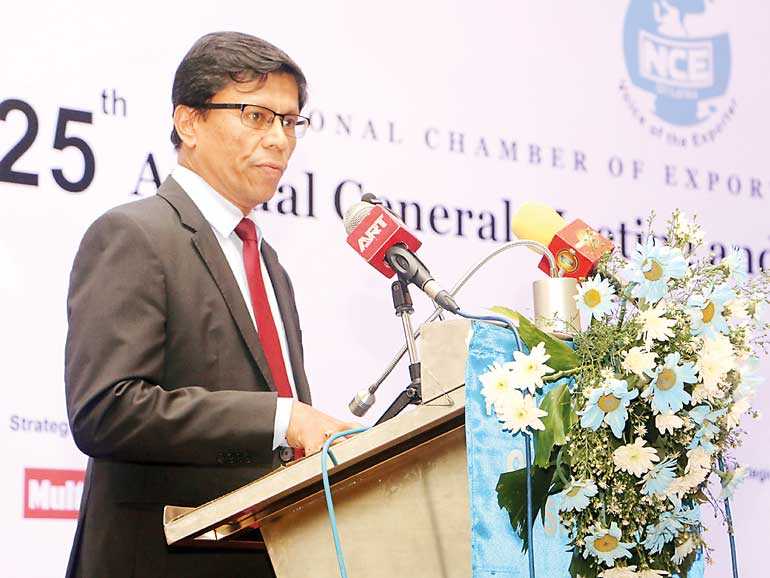Monday Feb 23, 2026
Monday Feb 23, 2026
Monday, 3 February 2020 01:15 - - {{hitsCtrl.values.hits}}

Director General of Commerce Nimal Karunathilake
In his keynote address as the Guest of Honour at the Annual General Meeting of the National Chamber of Exporters (NCE) held on 28 January at the Hotel Galadari in Colombo, Director General of Commerce Nimal Karunathilake traced Sri Lanka’s trade policy regime since implementation of the General Agreement on Trade and Tariff ‘GATT’, and the way forward in keeping with modern international trade.
He provided an overview of the key trade policy instruments adopted by Sri Lanka from the outset which comprised of Tariffs, and other Non-Tariff Measures (NTMs), related to quotas, Sanitary and Phytosanitary Measures (SPS) and Technical Barriers to Trade (TBT).
He stated that Sri Lanka was a Founding Member of GATT, which dealt with merchandise trade only, where all products were not covered. The objectives of GATT were the progressive reduction of tariffs, quotas and subsidies. The garment sector of Sri Lanka was able to develop as a major sector over the plantation crops tea, rubber, and coconut due to the quotas available under GATT. Subsequently quotas under the Multi Fibre Agreement (MFA) were phased out under the Agreement related to Textiles and Clothing of the World Trade Organization (WTO). Sri Lanka was a Founder Member of the WTO as well.
The Director General of Commerce stated that the measures formulated and implemented by Sri Lanka under the WTO in terms of its Foreign Trade Policy included the following:
The WTO Agreement unlike the GATT covers both Trade in Goods and Services under a single package. It also covers Trade Related Intellectual Property Rights (TRIPS), and Trade Related Investment Measures (TRIMS). Further under the WTO the Tariffs in respect of Products and Services Sectors were bound in respect of the Agreements with individual Member Countries including Sri Lanka. Also under the WTO quotas were progressively phased out and subsidies were also reduced.
Additionally, unilateral measures have been implemented by certain developed Countries in respect of their Trading Partners under a General Systems of Preferences (GSPs). Sri Lanka has such GSPs with countries such as the USA, Australia, etc.
Sri Lanka has also been a beneficiary under the GSP+ Scheme of the EU Countries under which a large number of Tariff Lines enjoy Duty Free Access to the EU market. This concession is however due to lapse at the end of 2023, since Sri Lanka has reached Upper Middle Income Status in terms of Per Capita Income.
Challenges faced by Sri Lanka both internally and externally
The Director General Commerce outlined the following in respect of the above challenges.
The way forward for Sri Lanka
The Director General Commerce, concluding his address outlined the following in regard to the way forward for Sri Lanka in terms of Foreign Trade Policy.